22 oct 2016
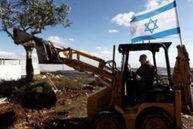
A group of extremist Israeli colonists invaded, Saturday, Palestinian lands close to Elon Moreh colony that was illegally built on Palestinian property, and started bulldozing large areas.
Ghassan Daghlas, the Palestinian Authority official in charge of monitoring Israeli settlement policies in the occupied territories, said the settlers bulldozed and uprooted large areas of lands belonging to residents from Deir al-Hatab town, east of Nablus.
He added that the invaded and bulldozed lands are in Ras al-Ein , extending across large areas of farmlands and orchards, only two kilometers away from Elon Moreh illegal colony.
The official also stated that the uprooting and bulldozing of the Palestinian lands aims at building a new illegally colonialist outpost.
Ghassan Daghlas, the Palestinian Authority official in charge of monitoring Israeli settlement policies in the occupied territories, said the settlers bulldozed and uprooted large areas of lands belonging to residents from Deir al-Hatab town, east of Nablus.
He added that the invaded and bulldozed lands are in Ras al-Ein , extending across large areas of farmlands and orchards, only two kilometers away from Elon Moreh illegal colony.
The official also stated that the uprooting and bulldozing of the Palestinian lands aims at building a new illegally colonialist outpost.
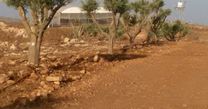
A horde of Jewish settlers, believed to be from Elei Zahav settlement, have appropriated a tract of Palestinian-owned agricultural land in Kafr ad-Dik town, west of Salfit.
Local farmers said that the settlers had planted perennial olive trees in parts of Dohr Sobh area to the north of the town, pointing out that the Israeli army already bulldozed the same area.
The area of Dohr Sobh belongs to farmers from the town according to ownership documents in their possession.
Local farmers said that the settlers had planted perennial olive trees in parts of Dohr Sobh area to the north of the town, pointing out that the Israeli army already bulldozed the same area.
The area of Dohr Sobh belongs to farmers from the town according to ownership documents in their possession.
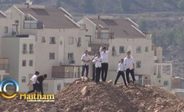
On Friday, several extremist Israeli colonists, taking position on a small hill behind the Annexation Wall, attacked the weekly nonviolent protest against the Israeli wall and colonies, in Bil’in village, near the central West Bank city of Ramallah.
Dozens of Palestinians, accompanied by Israeli and international peace activists, marched from the center of the village, raising Palestinian flags, chanting for national unity, the liberation of Palestine, and the release of all political prisoners.
The protesters marched towards an area that the Israeli army is planning for illegally confiscate, and started a cleanup of the Abu Lemon Reserve, before peacefully marching towards the gate of the Annexation Wall.
Some protesters started banging on the gate, to send a message to Israel and its army that the popular resistance in Bil’in will never stop until liberation and independence, and the removal of all of Israel’s colonies in occupied Palestine, built in direct violation of International Law and the Fourth Geneva Convention.
The soldiers did not attack the protesters, but a number of young fanatic Israeli colonists started throwing rocks at them, in addition to hurling racist insults and curses at them, while the army remained idle.
Dr. Rateb Abu Rahma, the media coordinator of the Popular Committee in Bil’in, said two delegations from Norway and Slain visited Bil’in, and listened to a detailed history about the nonviolent resistance in the village, the successes it achieved, and the high human costs resulting from Israeli military attacks. Video
Dozens of Palestinians, accompanied by Israeli and international peace activists, marched from the center of the village, raising Palestinian flags, chanting for national unity, the liberation of Palestine, and the release of all political prisoners.
The protesters marched towards an area that the Israeli army is planning for illegally confiscate, and started a cleanup of the Abu Lemon Reserve, before peacefully marching towards the gate of the Annexation Wall.
Some protesters started banging on the gate, to send a message to Israel and its army that the popular resistance in Bil’in will never stop until liberation and independence, and the removal of all of Israel’s colonies in occupied Palestine, built in direct violation of International Law and the Fourth Geneva Convention.
The soldiers did not attack the protesters, but a number of young fanatic Israeli colonists started throwing rocks at them, in addition to hurling racist insults and curses at them, while the army remained idle.
Dr. Rateb Abu Rahma, the media coordinator of the Popular Committee in Bil’in, said two delegations from Norway and Slain visited Bil’in, and listened to a detailed history about the nonviolent resistance in the village, the successes it achieved, and the high human costs resulting from Israeli military attacks. Video
21 oct 2016

A marathon race staged by Jewish settlers on Friday morning led to road closures and obstructed the movement of Palestinians between the north and south of the West Bank.
According to local sources, the Israeli occupation forces closed most of the main roads connecting the northern and central towns of the West Bank with the province of Ramallah and al-Bireh as a security measure to protect the participating settlers.
As a result, these closures forced many West Bankers to use longer bypass roads to reach their destinations.
Earlier, the Israeli army announced that these road closures would start at 6:30 am and end at 11:30 am in order to secure Road 60 (Ramallah-Nablus road), where the race took place.
A large number of Israeli troops had been deployed during the race along this arterial road and other nearby main roads.
Later in the afternoon, the Israeli army closed, with no known reason, the entrance to Sebastia town, north of Nablus, and embarked on intercepting Palestinian cars and photographing their license plates.
According to local sources, the Israeli occupation forces closed most of the main roads connecting the northern and central towns of the West Bank with the province of Ramallah and al-Bireh as a security measure to protect the participating settlers.
As a result, these closures forced many West Bankers to use longer bypass roads to reach their destinations.
Earlier, the Israeli army announced that these road closures would start at 6:30 am and end at 11:30 am in order to secure Road 60 (Ramallah-Nablus road), where the race took place.
A large number of Israeli troops had been deployed during the race along this arterial road and other nearby main roads.
Later in the afternoon, the Israeli army closed, with no known reason, the entrance to Sebastia town, north of Nablus, and embarked on intercepting Palestinian cars and photographing their license plates.

Israeli settlers, on Thursday, reportedly took over a Palestinian-owned area of land in al-Humma region of the northern Jordan Valley, and laid down an infrastructure, according to a local official.
M’otaz Bsharat, in charge of the settlement file in the Jordan Valley, said that settlers from the illegal Israeli settlements of Mechora and Sal’it, began placing wooden boards on land belonging to Palestinian residents in al-Humma almost a week ago.
Settlers laid further infrastructure, including electricity and water lines.
According to B’Tselem, an Israeli human rights center, since 1967, Israel has established over a hundred settlements in the occupied West Bank.
“These settlements were established on vast tracts of land taken from the Palestinians, in breach of international humanitarian law.
“The very existence of the settlements violates Palestinian human rights, including the right to property, equality, a decent standard of living and freedom of movement,” the group stated, according to WAFA.
M’otaz Bsharat, in charge of the settlement file in the Jordan Valley, said that settlers from the illegal Israeli settlements of Mechora and Sal’it, began placing wooden boards on land belonging to Palestinian residents in al-Humma almost a week ago.
Settlers laid further infrastructure, including electricity and water lines.
According to B’Tselem, an Israeli human rights center, since 1967, Israel has established over a hundred settlements in the occupied West Bank.
“These settlements were established on vast tracts of land taken from the Palestinians, in breach of international humanitarian law.
“The very existence of the settlements violates Palestinian human rights, including the right to property, equality, a decent standard of living and freedom of movement,” the group stated, according to WAFA.
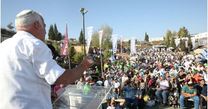
Thousands of Israeli settlers marched Thursday evening in protest against Israeli Prime Minister Benjamin Netanyahu’s intention to evacuate Amona settlement outpost.
The settlers called on Netanyahu to refuse the High Court’s decision to evacuate the settlement in two months time, Israeli media sources said.
Addressing the protest, Deputy Israeli Army Minister Eli Ben-Dahan said, “We were here on the eve of Yom Kippur when we told the residents of Amona that we are committed to solve the issue of the Jewish settlement in Judea and Samaria (West Bank), with Amona included.”
“We won’t give up, and if that doesn’t happen, we will present the Resolution Bill ourselves at the beginning of the next Knesset session. There won’t be a government without a resolution.”
Israeli Minister of Agriculture and Rural Development Uri Ariel also spoke at the rally, directly addressing Netanyahu saying, “Mr. Prime Minister, you hold the key to Amona in your hand. We ask and demand that you use that key and continue the settlement’s momentum.”
On Oct.3, Netanyahu decided to postpone the evacuation order of Amona outpost for six months.
The settlers called on Netanyahu to refuse the High Court’s decision to evacuate the settlement in two months time, Israeli media sources said.
Addressing the protest, Deputy Israeli Army Minister Eli Ben-Dahan said, “We were here on the eve of Yom Kippur when we told the residents of Amona that we are committed to solve the issue of the Jewish settlement in Judea and Samaria (West Bank), with Amona included.”
“We won’t give up, and if that doesn’t happen, we will present the Resolution Bill ourselves at the beginning of the next Knesset session. There won’t be a government without a resolution.”
Israeli Minister of Agriculture and Rural Development Uri Ariel also spoke at the rally, directly addressing Netanyahu saying, “Mr. Prime Minister, you hold the key to Amona in your hand. We ask and demand that you use that key and continue the settlement’s momentum.”
On Oct.3, Netanyahu decided to postpone the evacuation order of Amona outpost for six months.
20 oct 2016
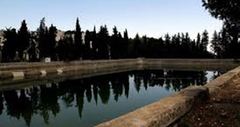
A group of Israeli settlers Thursday morning broke into the historical site of Solomon's Pools south of Bethlehem.
Eyewitnesses told PIC reporter that nearly 70 settlers stormed the site in the early morning hours escorted by 15 Israeli soldiers.
The settlers’ provocative break-in caused a state of tension among the locals, the sources added.
Such break-ins into the site has been repeated frequently by settlers under the pretext of performing Talmudic rituals.
Eyewitnesses told PIC reporter that nearly 70 settlers stormed the site in the early morning hours escorted by 15 Israeli soldiers.
The settlers’ provocative break-in caused a state of tension among the locals, the sources added.
Such break-ins into the site has been repeated frequently by settlers under the pretext of performing Talmudic rituals.
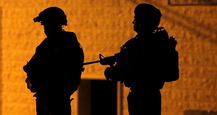
A number of Palestinians were kidnapped by Israeli occupation forces (IOF) from the West Bank at dawn Thursday.
Clashes flared up in Nablus after hundreds of Israeli fanatics stormed Joseph’s Tomb to celebrate Jewish holidays.
Three Palestinian youths sustained rubber bullet wounds, including one in the eye, after they were attacked by the occupation troops who escorted the Israeli settlers all the way through the break-in.
Buses carrying hundreds of other Israeli settlers showed up in the area, sparking clashes with Palestinian anti-occupation youths.
The IOF attacked the Palestinian protesters with randomly-shot spates of rubber bullets and teargas canisters.
Another IOF patrol stormed Nablus’s eastern town of Qaryout and wreaked havoc on the homes of anti-occupation activists.
Member of the local anti-settlement committee, Sadeq al-Qaryouti, said the occupation soldiers broke into his family home and threatened his brother with abduction in case he gets involved in further anti-settlement campaigns.
The IOF also stormed the home of the Director of the Qaryout Charity, Muhammad Mardawi, and the head of Qaryout Society, Muayad Salem.
The IOF further rolled into Jenin’s town of Qabatiya at the crack of dawn and kidnapped a Palestinian youth, 21, from his own family home.
Sounds of heavy gunfire have been detected during the break-in.
A military checkpoint was pitched by the IOF on the Jenin-Haifa Street near Zabouba town.
The IOF further shut down a printing press in al-Ram town under the request of the central region commander on allegations that it attempted to print banners mourning the slain anti-occupation protester Misbah Abu Sbeih.
Clashes flared up in Nablus after hundreds of Israeli fanatics stormed Joseph’s Tomb to celebrate Jewish holidays.
Three Palestinian youths sustained rubber bullet wounds, including one in the eye, after they were attacked by the occupation troops who escorted the Israeli settlers all the way through the break-in.
Buses carrying hundreds of other Israeli settlers showed up in the area, sparking clashes with Palestinian anti-occupation youths.
The IOF attacked the Palestinian protesters with randomly-shot spates of rubber bullets and teargas canisters.
Another IOF patrol stormed Nablus’s eastern town of Qaryout and wreaked havoc on the homes of anti-occupation activists.
Member of the local anti-settlement committee, Sadeq al-Qaryouti, said the occupation soldiers broke into his family home and threatened his brother with abduction in case he gets involved in further anti-settlement campaigns.
The IOF also stormed the home of the Director of the Qaryout Charity, Muhammad Mardawi, and the head of Qaryout Society, Muayad Salem.
The IOF further rolled into Jenin’s town of Qabatiya at the crack of dawn and kidnapped a Palestinian youth, 21, from his own family home.
Sounds of heavy gunfire have been detected during the break-in.
A military checkpoint was pitched by the IOF on the Jenin-Haifa Street near Zabouba town.
The IOF further shut down a printing press in al-Ram town under the request of the central region commander on allegations that it attempted to print banners mourning the slain anti-occupation protester Misbah Abu Sbeih.
19 oct 2016
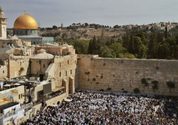
Thousands of Ultra-Orthodox Jews gathered, Wednesday morning, at Buraq plaza, to the west of Al-Aqsa Mosque to celebrate what is called Sukkot, the “Feast of Tabernacles”.
By celebrating their rituals, thousands of Jews gave the cold shoulders to UNESCO‘s resolution in which it considered the Al-Aqsa shrine an Islamic site, nullifying a Jewish connection to it.
As Sukkot lasts for seven days, the number of Jews coming to the Islamic holy site will increase during the coming hours, according to Al Ray Palestinian Media Agency.
Temple Mount and Eretz Yisrael Faithful Movement both announced the organizination of a protest march, Wednesday afternoon, starting at Hebron Gate and heading towards the Old City, in Jerusalem.
They will gather at Buraq Plaza, calling for the elimination of the Islamic presence at the site, and establishing the alleged “Temple Mount”.
By celebrating their rituals, thousands of Jews gave the cold shoulders to UNESCO‘s resolution in which it considered the Al-Aqsa shrine an Islamic site, nullifying a Jewish connection to it.
As Sukkot lasts for seven days, the number of Jews coming to the Islamic holy site will increase during the coming hours, according to Al Ray Palestinian Media Agency.
Temple Mount and Eretz Yisrael Faithful Movement both announced the organizination of a protest march, Wednesday afternoon, starting at Hebron Gate and heading towards the Old City, in Jerusalem.
They will gather at Buraq Plaza, calling for the elimination of the Islamic presence at the site, and establishing the alleged “Temple Mount”.
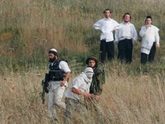
Dozens of Israeli settlers, on Sunday erected tents on Palestinian land located to the east of the town of Idhna, south of Hebron, chased Palestinian shepherds out and prevented them from grazing their livestock in the area, according to local sources.
Sources told WAFA correspondence that settlers erected three tents on Palestinian land, located near the Israeli settlement of Adora and built illegally on Palestinian land, where they performed Talmudic rituals to celebrate the Jewish holiday.
Ali ‘Ajajneh, one of the town locals living in the area, in tents and tin houses for the past 35 years, said settlers perform religious rituals in the area each year, during the Jewish holidays, and prevent shepherds from grazing their livestock as well as deny them access to a water spring in the area, all under the protection of Israeli army.
According to B’Tselem, the Israeli Information Center for Human Rights in the Occupied Territories: Since 1967, Israel has established over a hundred settlements in the West Bank.
“These settlements were established on vast tracts of land taken from the Palestinians, in breach of international humanitarian law.”
“The very existence of the settlements violates Palestinian human rights, including the right to property, equality, a decent standard of living and freedom of movement. Israel’s dramatic alteration of the West Bank map has precluded realization of Palestinians’ right to self-determination in a viable Palestinian state,” the center maintained.
B’Tselem stressed, “As the occupying force, Israel must protect the Palestinians in the West Bank. However, the Israeli authorities neglect to fulfill this responsibility and do not do enough to prevent Israeli civilians from attacking Palestinians, their property and their lands.”
Sources told WAFA correspondence that settlers erected three tents on Palestinian land, located near the Israeli settlement of Adora and built illegally on Palestinian land, where they performed Talmudic rituals to celebrate the Jewish holiday.
Ali ‘Ajajneh, one of the town locals living in the area, in tents and tin houses for the past 35 years, said settlers perform religious rituals in the area each year, during the Jewish holidays, and prevent shepherds from grazing their livestock as well as deny them access to a water spring in the area, all under the protection of Israeli army.
According to B’Tselem, the Israeli Information Center for Human Rights in the Occupied Territories: Since 1967, Israel has established over a hundred settlements in the West Bank.
“These settlements were established on vast tracts of land taken from the Palestinians, in breach of international humanitarian law.”
“The very existence of the settlements violates Palestinian human rights, including the right to property, equality, a decent standard of living and freedom of movement. Israel’s dramatic alteration of the West Bank map has precluded realization of Palestinians’ right to self-determination in a viable Palestinian state,” the center maintained.
B’Tselem stressed, “As the occupying force, Israel must protect the Palestinians in the West Bank. However, the Israeli authorities neglect to fulfill this responsibility and do not do enough to prevent Israeli civilians from attacking Palestinians, their property and their lands.”
